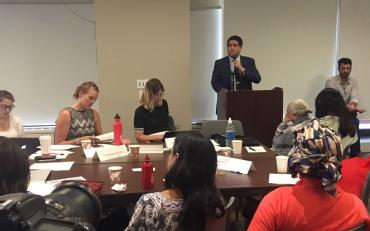(10 July, New York) At the start of this year’s United Nations High-level Political Forum (HLPF) under the theme “Eradicating Poverty and Promoting Prosperity in a Changing World”, leading international disability rights advocates stress that poverty cannot be eradicated unless persons with disabilities and their representative organizations are at the heart of the design, implementation and review of international and national poverty reduction programs on an equal basis with other groups.
- The UN High-Level Political Forum on ‘eradicating poverty’ begins on 10th July
- Ahead of this, a new global report shows major barriers for persons with disabilities to participate in the implementation of the SDGs and poverty reduction programs in many countries
- Two top global disability activists – Yetnebersh Nigussie and Colin Allen – are available for interview from New York
“Governments and the international community must make people with disabilities a top-priority in the global efforts to end poverty. We demand a progressive increase in dedicated domestic resource allocation and international development cooperation to support the full inclusion of persons with disabilities,” says Colin Allen, Chair of the International Disability Alliance, President of the World Federation of the Deaf, and a member of the Stakeholder Group of Persons with Disabilities.
Persons with disabilities continue to be the world’s largest and most frequently overlooked marginalized group. An estimated one billion people worldwide have disabilities, over 80 per cent of whom live in developing countries and are overrepresented among the poorest members of the community.
A new global report by the Stakeholder Group of Persons with Disabilities sheds light on the level of the participation of people with disabilities in their countries’ review process of implementing the 2030 Agenda (also called the ‘Voluntary National Reviews‘(VNR)), including SDGs related to poverty reduction. The report showcases the role and engagement of Organizations of Persons with Disabilities (DPOs) in the implementation of the Sustainable Development Goals within their countries and explains the interlink between national, regional and global processes. The report contains case studies from 15 VNR-countries, out of the 44 countries which have volunteered to report on the implementation of the SDGs at national level.
The findings indicate that while organizations of persons of disabilities actively seek opportunities to engage with governments, many are being turned away. Public consultations often exclude persons with disabilities and their representative organizations. Even when wider civil society organizations are invited to participate, meetings and documents are often inaccessible to persons with disabilities, thus excluding them from participation.
“The findings of this report are highly critical of the rate of progress for the inclusion of people with disabilities at the global and national policy levels. The eradication of poverty requires transformative efforts, putting the furthest behind first and adapting institutions and policies to take into account the multidimensional nature of poverty,” explains Yetnebersh Nigussie, an official representative of the Stakeholder Group of Persons with Disabilities and Senior Inclusion Advisor of Light for the World, a member of the International Disability and Development Consortium. Yetnebersh adds: “There is a significant lack of data on persons with disabilities in most countries we looked at in our report; this issue must urgently be addressed.”
While the international community and governments have called for the disaggregation of data by disability, this often fails to be collected at national or local levels. Indeed, widely tested methodologies that could be used to generate disaggregated data exist, such as the Washington Group Short Set of Questions.
“We urge global and national stakeholders to start using this methodology, otherwise there will be detrimental consequences to the implementation process of the Sustainable Development Goals. Ultimately, it will lead to leaving persons with disabilities uncounted and behind. Organisations of persons with disabilities are here and ready to work with their Governments and the UN to ensure that no one is left behind!” Yetnebersh Nigussie concludes.
Notes to editors
- Side Event during the HLPF: Town-hall style discussion on “Sharing national experiences of persons with disabilities regarding multiple and cross-cutting discrimination as core issues contributing to poverty” Thursday, 14th July, 13:15-14:30 / Conference Room 5 / United Nations Headquarter, New York.
- Global report on the participation of organizations of persons with disabilities within the SDG implementation and review processes on national level
- Position paper by the Stakeholder Group of Persons with Disabilities on “Eradicating Poverty and Promoting Prosperity for Persons with Disabilities”
- World Report on Disability, WHO & World Bank, 2011
Contact:
For more information, including interview requests, contact:
- Marianne Fobel, LIGHT FOR THE WORLD/Stakeholder Group of Persons with Disabilities
m.fobel [at] light-for-the-world.org, +43 664 540 6847 - Talin Avades, International Disability Alliance/ Stakeholder Group of Persons with Disabilities
tavades [at] ida-secretariat.org
About the Stakeholder Group of Persons with Disabilities
The Stakeholder Group of Persons with Disabilities for Sustainable Development (SD) is the focal point for UNDESA, ECOSOC and the General Assembly for all UN Sustainable Development policies. The scope of the Stakeholder Group of Persons with Disabilities for SD responsibility covers the Rio+20 outcome (including the 2030 Agenda, Sustainable Development Goals, High-level Political Forum, Financing for Sustainable Development, at global and regional policy processes of the United Nations. In addition, Stakeholder Group of Persons with Disabilities for Sustainable Development aims to cooperate closely with other constituencies linked to other UN policy processes. The Stakeholder Group of Persons with Disabilities is a recognized other stakeholder group within the UN and as such part of the Major Groups and other Stakeholder Coordination Mechanism.
- More about the Stakeholder Group of Persons with Disabilities
- Read the Terms of Reference for the Stakeholder Group of Persons with Disabilities

